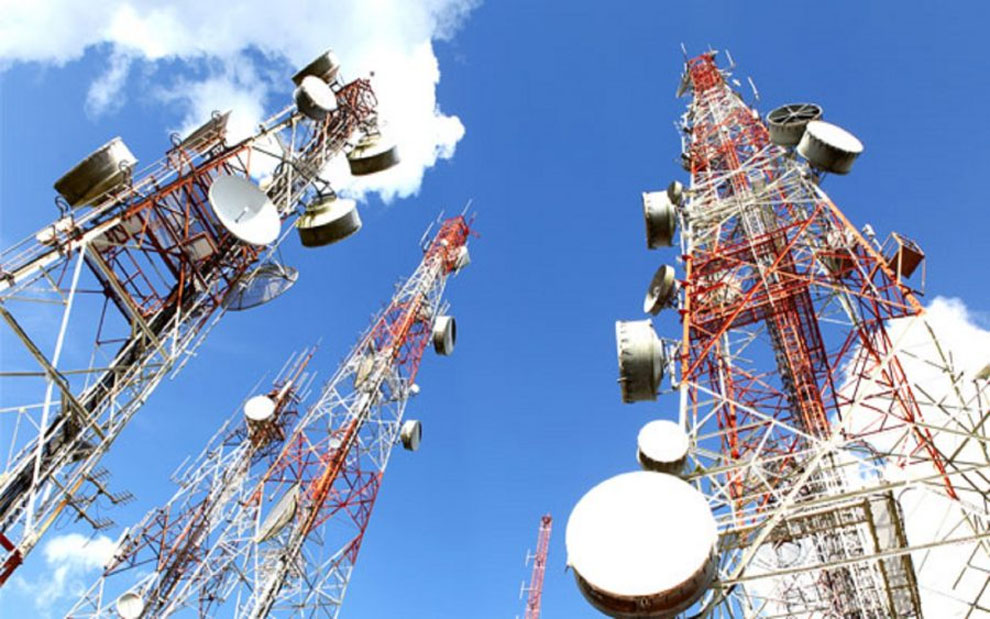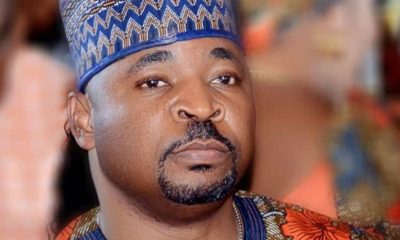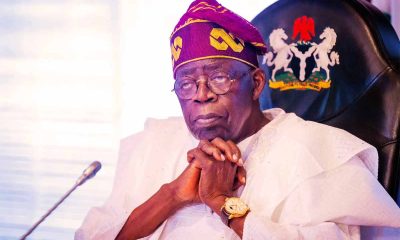metro
Nigerians drags NCC to court over 50% tariff hike

Nigerians drags NCC to court over 50% tariff hike
Telecom subscribers and advocacy groups in Nigeria are mounting a fierce challenge against the recently announced 50% hike in call and data tariffs.
The decision has prompted legal action following unsuccessful engagements with the Nigerian Communications Commission (NCC).
The National Association of Telecommunications Subscribers (NATCOMS) announced plans to file a lawsuit against the NCC on Wednesday, citing the commission’s failure to heed demands for a reduction of the hike to a more manageable 10%.
The tariff adjustment, implemented last week after over a decade without changes, has sparked widespread criticism. Advocacy groups such as the Socio-Economic Rights and Accountability Project (SERAP) and the Nigeria Labour Congress (NLC) have joined NATCOMS in condemning the hike.
The subscriber group, which represents 157 million Nigerians who rely on affordable telecom services, on Friday initiated talks via correspondence, requesting the NCC reconsider its stands within three working days. The regulator failed to do so.
NATCOMS President, Adeolu Ogunbanjo, who spoke to The PUNCH on Tuesday, revealed the NCC’s inaction to respond to its request, which has left consumers increasingly disillusioned by the rising cost of telecom services.
Ogunbanjo stated, “We gave them until the end of the day (Tuesday) to respond. Since we have not received any response, we are moving forward with the court process starting tomorrow (Wednesday).
READ ALSO:
- Troops intensify hunt for Bello Turji, foil arms supply to terrorists
- FULL DETAILS: JAMB 2025 UTME registration, mock, examination dates
- Neymar to rejoin Brazilian club Santos after ending Al-Hilal deal
The Director of Publicity at the NCC, Reuben Mouka, had not responded to questions put forward by our correspondent via text messages as of the time of filing this report.
Ogunbanjo said the letter sent to NCC highlighted the burden that the 50 per cent hike places on subscribers, especially those in lower-income brackets who rely on affordable communication services for their daily activities.
The NATCOMS President said, “Our National Secretary informed us that the NCC has until 11:59 pm today (Tuesday) to respond. They can still reply through their website, which is available 24/7, but with no word from them, we are left with no choice but to proceed with legal action.”
The association’s decision to move forward with court action is now imminent, with the plea letter scheduled to be released to the press tomorrow.
Adding to the mounting legal pressure on the NCC, the Socio-Economic Rights and Accountability Project also filed a lawsuit last Friday at the Federal High Court in Abuja against the government of President Bola Tinubu. The rights group described the tariff hike as “arbitrary, unconstitutional, unlawful, unfair, and unreasonable.”
In the suit, numbered FHC/ABJ/CS/111/2025, SERAP is asking the court to determine whether the NCC’s decision to authorise the tariff hike violates Nigerians’ freedom of expression and access to information.
“The unilateral decision by the NCC to authorise telcos to hike telecom tariffs by 50 per cent is arbitrary and inconsistent with constitutional guarantees,” SERAP said in its filing.
SERAP is also seeking “an order of interim injunction restraining the NCC, its officers, agents, privies, assigns, or any other person or persons acting on its instructions from further implementing, enforcing and doing any act to give effect to the decision of the NCC authorizing telecom tariff hike by 50 percent.
While telecom operators justify the hike, which is supposed to take effect in February as a necessary step to sustain their businesses, many are also planning to expand their infrastructure to improve services.
Several major players have outlined plans to invest in network upgrades, better coverage, and more reliable connections, all aimed at making the higher tariffs more justifiable in the eyes of consumers.
These moves are part of broader efforts to adapt to the increasing demand for digital services as Nigeria’s telecom sector continues to grow.
However, analysts caution that the tariff hike alone may not solve the sector’s underlying issues. Despite the price increase, telecom companies continue to struggle with volatile exchange rates, which add pressure to their already strained financial models.
READ ALSO:
- JUST IN: Amnesty International demands Sowore immediate release
- Kaduna teenager imprisoned for assaulting sex worker
- 33-year-old man arrested for severing wife’s wrist in Enugu community
The fluctuating value of the naira against the dollar makes it difficult for telecom operators to plan long-term investments and cover operational costs, even with a tariff hike.
Stakeholders support hike
However, several Federal Government agencies and industry stakeholders, including Finance Minister Wale Edun and the Lagos Chamber of Commerce and Industry, have voiced their support for the tariff adjustment.
They argue that the hike is a necessary step toward addressing the operational challenges faced by telecom operators and have called for corresponding improvements in service quality to justify the increase.
On Monday, the Lagos Chamber of Commerce and Industry issued a statement calling on telecom operators in the country to improve their service delivery and support the government in automating its services.
The Director-General of LCCI, Chinyere Almona, urged the regulators on operational cost efficiency for businesses to help drive down their production costs.
“Looking beyond the hike, the operators and regulators need to settle down into delivering quality services to drive operational cost efficiency for businesses and support the automation of government services.”
Defending the adjustment, Finance Minister Wale Edun emphasised the need to account for rising inflation and operational costs that have accumulated over the past 12 years.
He said this during an interview on Arise News at the 2025 World Economic Forum in Davos, Switzerland, last week.
“There is a need to reflect the fact that over 12 years, there has been a rise in costs, there has been inflation, and that needs to be reflected,” Edun stated. He described the hike as a balancing act, aimed at enabling telecom operators to maintain sustainability while safeguarding consumer interests.
Edun further highlighted the government’s primary objective of ensuring that telecom operators deliver efficient services. “We don’t want dropped calls. We want good quality services from them. And at the same time, we want them growing, employing people, and adding to the country’s GDP,” he said.
Last week, Chairman of ALTON, Gbenga Adebayor, told The PUNCH that many systems within the telecom sector are outdated and equipment requires optimisation.
“We are actively working on improving the cost-mile experience significantly,” he said. Our goal is long-term sustainability—no telecom operator wants to provide poor service quality. Every minute of uptime contributes to revenue, and it’s crucial that we show tangible improvements in user experience and deliver something better to subscribers.”
MTN, the biggest operator, noted that the development is a significant milestone in ensuring the long-term sustainability of the telecom sector while empowering millions of people and businesses and contributing to the country’s overall economic development.
The Chief Executive Officer of MTN Nigeria, Karl Toriola, stated, “This tariff adjustment represents an important step towards addressing the impacts of the prevailing economic challenges on our business and industry.
“It will enable us to maintain the critical investments required to deliver reliable, high-quality services to Nigerians. We remain committed to supporting Nigeria’s digital transformation agenda and driving inclusive growth for all stakeholders.”
Airtel Nigeria’s Chief Executive Officer, Dinesh Balsingh, defended the tariff hike, describing it as a critical measure to ensure the survival and growth of the telecommunications sector while protecting consumer interests.
CEO Balsingh noted that the development underscores the regulator’s commitment to fostering sustainability and enhancing investment in the telecommunications industry for superior service delivery.
“The tariff adjustment reflects a balanced approach to ensuring the sustainability of the telecom sector while safeguarding the interests of consumers.
“The price increase, which was highly needed for the survival and continued growth of the industry, will enable us to continue investing in network infrastructure, expanding coverage, and delivering improved products and services that meet the evolving needs of our customers,” he said in a statement.
The operator said it remains committed to its mission of bridging the digital divide by offering reliable and affordable telecommunications services.
With Nigeria’s vibrant economy and dynamic population, the company believes the decision by NCC creates an environment conducive to innovation and growth, benefiting consumers and the industry alike.
“We are confident that this development will pave the way for even greater advancements in telecommunications services across the country,” added Balsingh. “Our focus remains on providing exceptional customer satisfaction while contributing to the long-term sustainability of the industry.”
Nigerians drags NCC to court over 50% tariff hike
Punch
metro
Attackers of Benue communities not Nigerians, says Gov Alia

Attackers of Benue communities not Nigerians, says Gov Alia
Benue State Governor, Hyacinth Alia, says the criminal elements involved in the recent killings across the state are not Nigerians.
He said they were found speaking unfamiliar languages and exhibit foreign characteristics.
Alia disclosed this on Tuesday while speaking as a guest on Politics Today, a current affairs programme on Channels Television.
He was responding to the assaults on the state that have left scores killed and hundreds of residents displaced.
When asked about the identity of the attackers terrorising communities in the state, the governor said it was important to first clarify the nature of the threat.
“Let’s have the narrative very correct. We know Nigerians—by our ethnicities, we can identify a Fulani man, a Yoruba man, a Hausa man—we know them. Even the regular traditional herders, we know them. They work with cows, herding with sticks,” Alia said.
“But these folks [the attackers] are coming in fully armed with AK-47s and 49s. They do not bear the Nigerian look. They don’t speak like we do. Even the Hausa they speak is one sort of Hausa.”
The governor said intelligence from locals suggested the attackers could be foreign nationals.
“It’s not the normal Hausa we Nigerians speak. So it is with the Fulani they speak. There is a trend in the language they speak, and some of our people who understand what they speak give it names.
“They say they are Malians and different from our people. But they are not Nigerians—believe it,” he added.
Governor Alia said this marked a new and more dangerous phase of violence compared to previous confrontations with traditional herders.
“This is the second phase we are seeing. The initial ones were with the traditional herders. The traditional herders—we had fewer troubles with them.
“What we are experiencing has a new, different, strange face, and it’s now alarming,” the governor said.
“These terrorists are everywhere. We are under a siege. These people just come and hit and kill and run back. Where are they running to?”
He revealed that the attacks appeared highly coordinated and strategically executed.
“The way these killings are being planned and carried out is definitely coordinated,” he stated.
“Some local government areas in Benue share borders with Cameroon, and those borders are quite porous.”
The governor also said intelligence reports point to the existence of terrorist hideouts in parts of Taraba and Nasarawa states, as well as in areas within Cameroon.
“The terrorists have their havens in Taraba, Nasarawa, and in border regions of Cameroon,” Alia stated.
This came amid growing concern over a spate of attacks across Benue and Plateau states that have claimed dozens of lives, displaced entire communities, and deepened the security crisis in Nigeria’s Middle Belt.
Two weeks ago, on the same show, Plateau State Governor, Caleb Muftwang, also raised fresh concerns about the identity of those behind the persistent killings in the state, revealing that many of the attackers do not speak any known Nigerian language.
metro
I’m not in supremacy battle with Ooni, says new Alaafin

I’m not in supremacy battle with Ooni, says new Alaafin
Newly installed Alaafin of Oyo, Oba Abimbola Owoade, has denied being in royal supremacy battle with the Ooni of Ife, Oba Adeyeye Ogunwusi, or any other monarch.
He spoke through his Director of Media and Publicity, Bode Durojaiye, in a reaction to an online viral video
He also said at no time did the Alaafin order his men to beat up the father of a monarch of a village in the United States of America.
The statement read in part, “The attention of the Media Office of the Alaafin of Oyo has been drawn to a misleading and wicked fabrication of a video produced by an online medium, Awikonko TV, and shown on YouTube .
“In the malicious video, the anchor narrated how the Alaafin of Oyo , Oba Abimbola Akeem Owoade 1, ordered his men to beat to a pulp ‘father of the monarch’ of a village in the United States of America and later handed him over to the police.
“The misguided anchor said the action was in attestation of Alaafin Owoade’s supremacy battle with the Ooni of Ife. The anchor of the video was not only a pathological liar, but should be confined to dungeon of eternity for being heartless in dishing out such lies.
“What really happened was that the ancestral lineage of descendants of Oyotunji village in the USA is Oyo town. It was more than two occasions, during the reign of the late Alaafin, Oba Lamidi Adeyemi III , that the people of Oyotunji village traced their ancestral home to Oyo town and were given red carpet reception.
“When a new Alaafin was appointed and after the coronation, the Oyotunji monarch thought it expedient to pay congratulations visit to his ancestral royal father, which he did.
“He was well received by the Alaafin before his departure.
“Where then did this online medium defecating the social media space get its own story, if not a cooked up one. The video shown neither correlates nor synchronises with the anchor.
“What is more? How possible is it for the Alaafin to order the beating of a monarch who paid him a visit from a foreign village and with Oyo town as its ancestral home?
“However, to those who are bereft of Yoruba history, as a purveyor of authentic Yoruba traditions and given the responsibility of the Alaafin who is expected to be diplomatic, energetic and protective of his people could not have condescended so low as to have ordered his men to beat to a pulp father of a monarch from a village that belongs to Oyo in the United States of America.”
He said further, “Alaafin Owoade 1 is a royal father who puts emphasis on his own integrity, works to develop a strong ethical foundation with an understanding of Godly behaviour.”
metro
Bandits attack Kwara North, kill vigilante, six others

Bandits attack Kwara North, kill vigilante, six others
Suspected bandits killed seven people—including a vigilante—in separate attacks on Sunday, April 21, 2025, in Ilesha Baruba and Kemanji communities of Baruten and Kaiama Local Government Areas, Kwara North Senatorial District.
According to the state police spokesperson, SP Adetoun Ejire‑Adeyemi, “The state police command is investigating two grievous incidents that occurred on Sunday, April 21, 2025, in Baruten and Kaiama Local Government Areas of the state.”
At around 9:30 p.m., ten armed men stormed the Ilesha Baruba Motor Park and opened fire on civilians gathered at a nearby relaxation spot. Six people—identified as Alhaji Ja’awire, AbdulJabar, Mohammed Nasamu, and three others—were killed, and two more suffered serious gunshot wounds.
READ ALSO:
- Rivers: Tinubu set to emergency rule after meeting Fubara
- NNPCL: Protesters storm AGF office, demand probe of Mele Kyari
- Fresh herders’ attack claims 11 lives in Benue
“The deceased have been deposited at the Ilesha Baruba Morgue for autopsy, while the injured are receiving treatment,” Ejire‑Adeyemi said.
Earlier that day, at about 11:30 a.m., a Kemanji-based vigilante group on patrol in the Kainji National Park area came under fire from suspected bandits.
In the ensuing exchange, three bandits were fatally wounded, and vigilante member Yusuf Samba “M” was shot and later succumbed to his injuries.
Ejire‑Adeyemi added that police have arrested an informant linked to the bandit network. “This individual has proven to be a valuable asset in advancing the investigation.”
The Kwara State Police Command has activated full security measures—including tactical teams, intensified surveillance, and intelligence‑led operations—to restore peace.
Residents are urged to cooperate with law enforcement and warned that anyone aiding or abetting crime will “face the full weight of the law.”
Bandits attack Kwara North, kill vigilante, six others
-

 International3 days ago
International3 days agoBreaking: Pope Francis dies at 88 – Vatican
-

 metro2 days ago
metro2 days agoBring your children to compete with mine, MC Oluomo challenges those mocking his spoken English
-

 metro1 day ago
metro1 day agoRivers: Tinubu meets with Fubara, may lift his suspension
-

 metro3 days ago
metro3 days agoHow Nigerian hotelier died during wife’s 60th birthday celebration
-

 News2 days ago
News2 days agoTinubu returns to Nigeria after France, UK trip
-

 Business2 days ago
Business2 days agoMarketers count losses as NNPC slashes petrol price
-

 metro2 days ago
metro2 days agoAnsar-Ud-Deen Society of Nigeria elects new leaders, Tinubu praises educational contributions
-

 metro20 hours ago
metro20 hours agoI’m not in supremacy battle with Ooni, says new Alaafin













